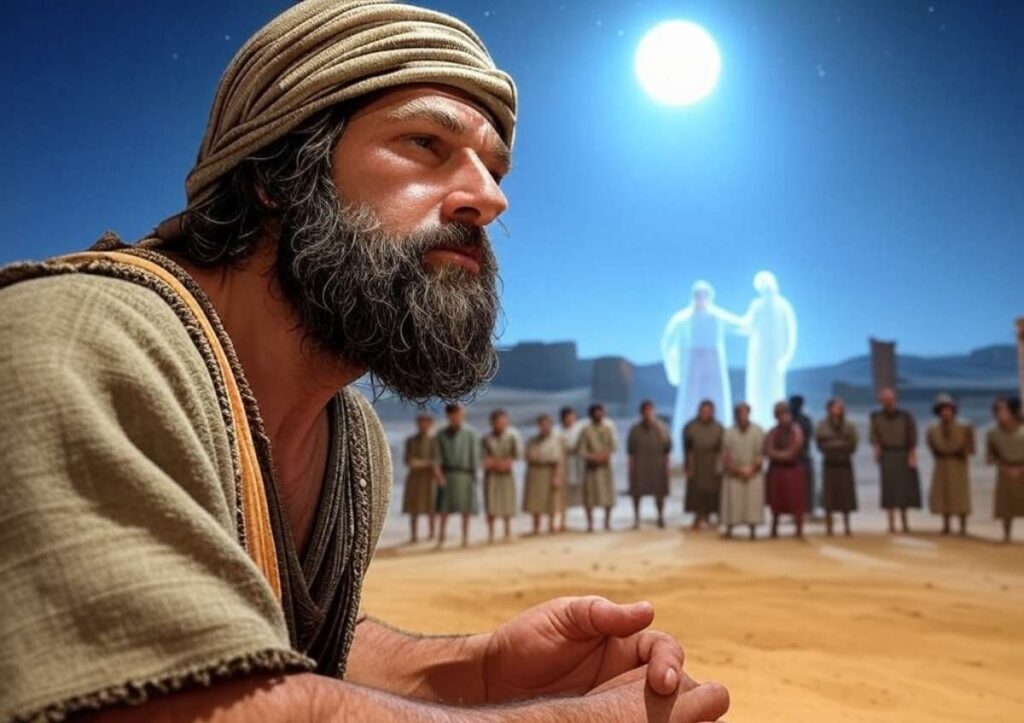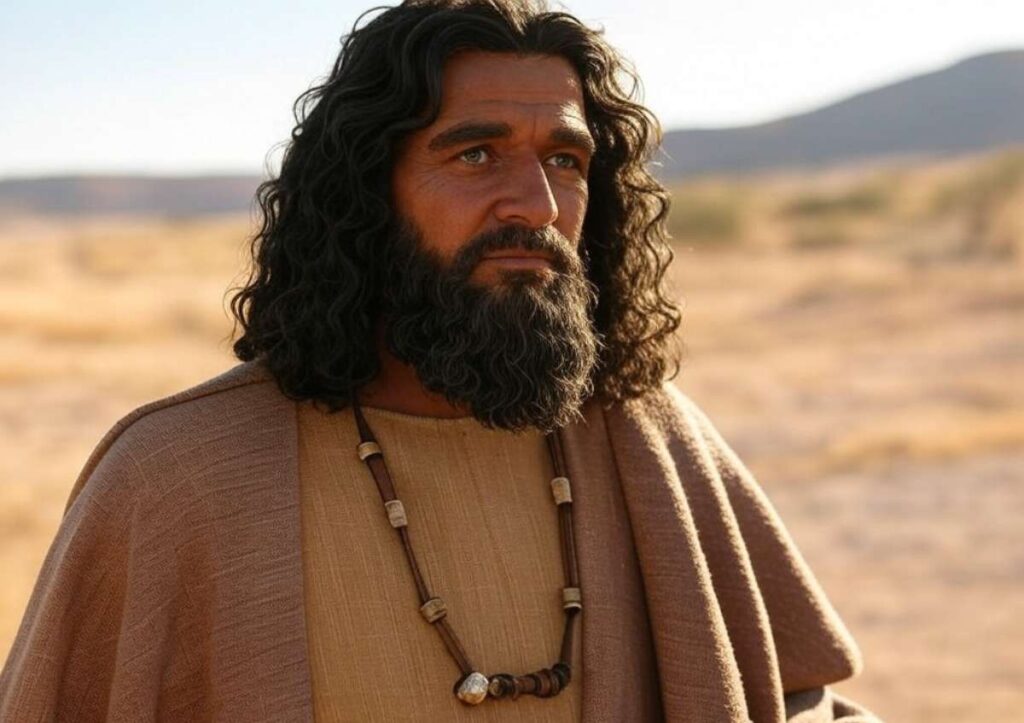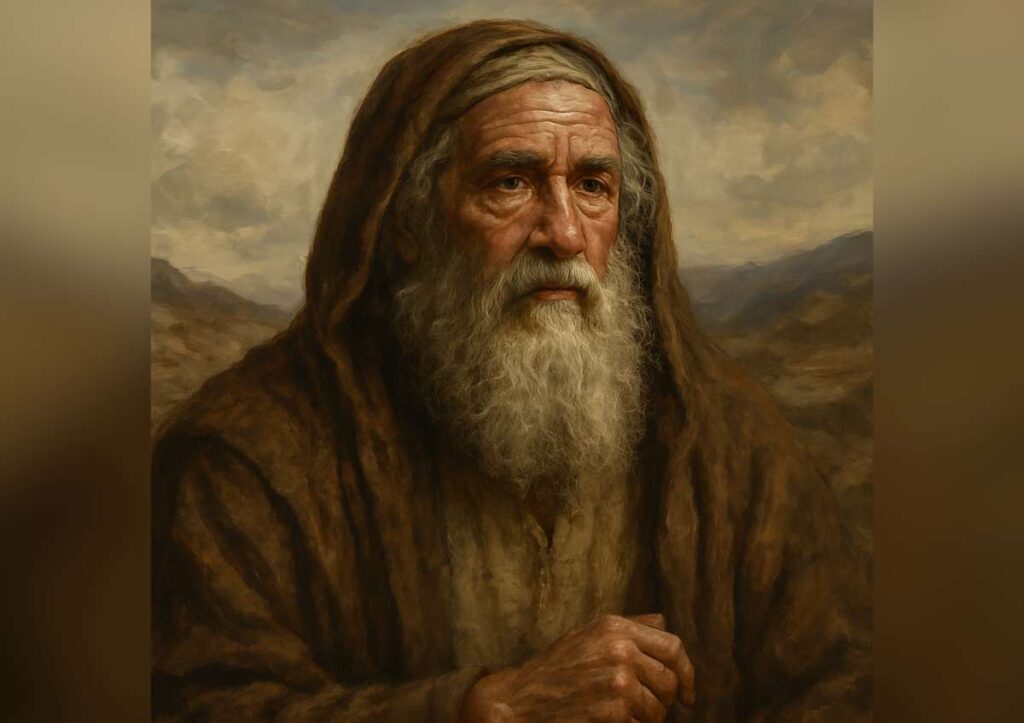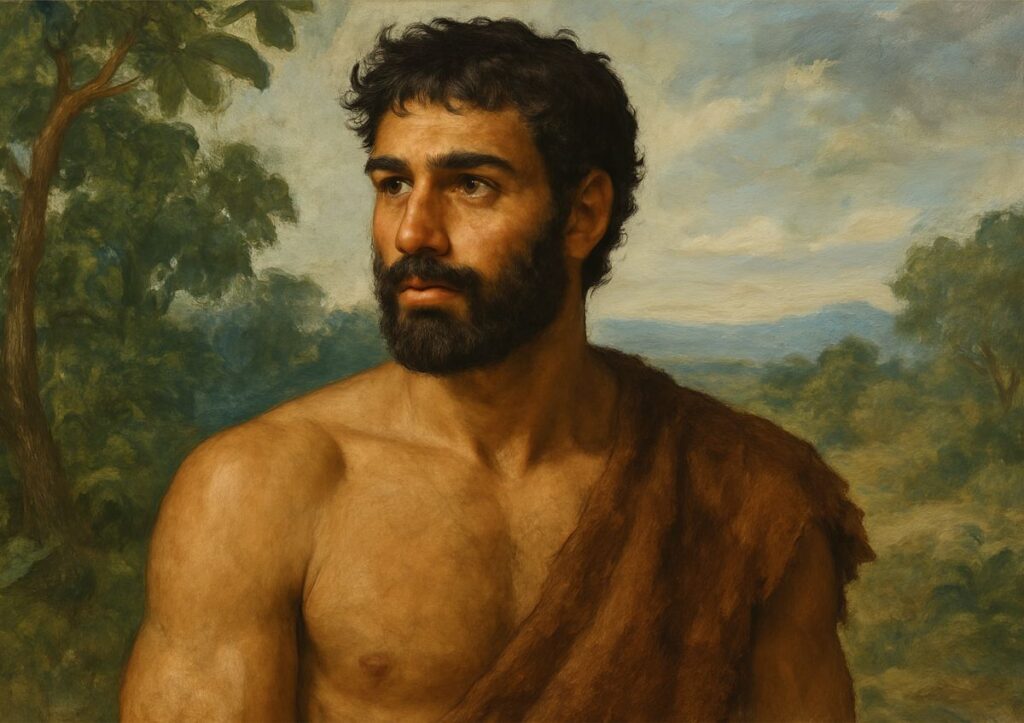The post Who Is Joseph? appeared first on Discover Bible Verse.
]]>Joseph is the 11th son of Jacob (Israel) and the firstborn of Rachel, his beloved wife. His story is told in Genesis chapters 37–50. Joseph’s name means “may He add”, a reflection of Rachel’s hope for more children. He is best known for his colorful robe, his ability to interpret dreams, and his remarkable journey from slavery to power, ultimately becoming the savior of his family and a type of Christ.

Early Life and Family Conflict
➤ Favored Son
- Joseph was deeply loved by his father Jacob, who gave him a coat of many colors—a symbol of favoritism and status.
- This favoritism sparked jealousy and hatred among his ten older brothers.
➤ Dreams and Destiny (Genesis 37:5–11)
- Joseph had prophetic dreams showing his family bowing down to him, which further enraged his brothers.
- Though immature in how he shared the dreams, these dreams revealed God’s calling on his life.
Betrayal and Suffering
➤ Sold into Slavery
- At just 17 years old, Joseph was betrayed by his brothers, thrown into a pit, and sold to Ishmaelite traders.
- They told their father he had been killed by a wild animal, showing his bloody robe as false evidence.
➤ In Potiphar’s House (Genesis 39)
- Joseph was sold to Potiphar, a high-ranking Egyptian official.
- God’s favor was with Joseph, and he became head of Potiphar’s household.
- Potiphar’s wife tried to seduce him; when Joseph refused, she falsely accused him of assault.
- Joseph was imprisoned despite his innocence.
Prison to Palace
➤ In Prison
- Even in prison, Joseph found favor and was put in charge of other inmates.
- He interpreted dreams for two of Pharaoh’s servants—the cupbearer and the baker.
- His interpretations came true, but he was forgotten for two more years.
➤ Before Pharaoh (Genesis 41)
- Pharaoh had troubling dreams no one could interpret.
- The cupbearer remembered Joseph, and he was brought before Pharaoh.
- Joseph interpreted Pharaoh’s dreams, predicting seven years of abundance followed by seven years of famine.
- Joseph advised Pharaoh to prepare wisely.
➤ Promotion to Power
- Pharaoh was so impressed that he made Joseph second-in-command over all Egypt.
- Joseph was 30 years old when he stepped into this leadership role—after 13 years of trials.
Savior in the Famine
➤ Administrator of Egypt
- Joseph managed Egypt’s resources wisely during the years of abundance and famine.
- People from surrounding nations came to Egypt to buy grain—including his own brothers.
➤ Reunion and Forgiveness (Genesis 42–45)
- His brothers came to Egypt to buy food, not knowing Joseph was alive.
- Joseph tested their hearts through a series of events.
- Eventually, he revealed his identity in one of the most emotional scenes in the Bible (Genesis 45:1–15).
- He forgave his brothers, saying: “You meant evil against me, but God meant it for good…” (Genesis 50:20)
➤ Family Restored
- Joseph brought his father Jacob and the entire family to Egypt, settling them in Goshen.
- He ensured their survival and peace during the famine.
Legacy and Death
- Joseph lived to be 110 years old.
- Before his death, he reminded his family of God’s promise to bring them back to the Promised Land.
- His last request was that his bones be carried back to Canaan (fulfilled in Exodus 13:19).
- Joseph’s faith and leadership left a legacy that shaped the destiny of Israel.
Theological and Spiritual Significance
1. A Foreshadowing of Jesus
- Betrayed by his brothers → Sold for silver → Falsely accused → Raised to rule → Became the savior of his people.
- Joseph is a type of Christ, reflecting Jesus’ journey from suffering to glory.
2. God’s Sovereignty Over Suffering
- Joseph’s life proves that God is working behind the scenes, even when life feels unfair or unjust.
- God used every trial to position Joseph for his divine assignment.
3. Forgiveness and Reconciliation
- Joseph forgave those who hurt him deeply, showing how grace triumphs over revenge.
Lessons from Joseph’s Life
- Dream big and trust God’s timing – Joseph waited years for his dreams to come true.
- Integrity matters – He stayed righteous in temptation and in trials.
- Don’t give up in the pit – God can lift you to a palace.
- God uses pain for purpose – What others meant for harm, God used for good.
- Forgive those who hurt you – Reconciliation brings healing and freedom.
Summary
Joseph was a man who went from the pit to the palace, from being a slave to a savior, from betrayed to blessed. Through every twist in his journey, God was with him, shaping him into a vessel of preservation for the very people who wronged him. Joseph’s story reminds us that God is faithful, purposeful, and always in control, even in our darkest seasons.
The post Who Is Joseph? appeared first on Discover Bible Verse.
]]>The post Who Is Jacob? appeared first on Discover Bible Verse.
]]>Jacob is the son of Isaac and Rebekah, the twin brother of Esau, and the father of the twelve tribes of Israel. His name means “supplanter” or “heel-grabber”, reflecting his early actions, but after a divine encounter, God renamed him Israel, meaning “he struggles with God” or “God prevails.” Jacob’s life is chronicled in Genesis 25–50.

Early Life and Family
➤ Birth and Prophecy (Genesis 25:19–26)
- Jacob was born grasping Esau’s heel, symbolizing his desire to take his brother’s position.
- God foretold that “the older shall serve the younger,” a prophecy that would shape Jacob’s future.
- He was quiet and thoughtful, staying among the tents, while Esau was rugged and favored by their father Isaac.
Deception and Conflict
➤ The Birthright and Blessing
- Jacob convinced Esau to sell his birthright for a bowl of stew (Genesis 25:29–34).
- Later, with his mother Rebekah’s help, Jacob deceived Isaac into giving him Esau’s blessing (Genesis 27), causing a major rift between the brothers.
- Fearing Esau’s wrath, Jacob fled to Haran, where his life took a dramatic turn.
Love, Labor, and Family (Genesis 29–31)
➤ Jacob Meets Rachel
- On the way to Haran, Jacob had a dream of a ladder reaching to heaven, where God reaffirmed the covenant made with Abraham and Isaac (Genesis 28:10–22).
- He arrived at his uncle Laban’s house and fell in love with Rachel.
- He worked seven years for her hand in marriage, only to be deceived and given her sister Leah instead.
- Jacob eventually married Rachel too, after working another seven years, showing persistence and devotion.
➤ The Birth of the 12 Sons
- Between Leah, Rachel, and their maidservants (Zilpah and Bilhah), Jacob fathered 12 sons, who became the 12 tribes of Israel:
- Reuben, Simeon, Levi, Judah, Dan, Naphtali, Gad, Asher, Issachar, Zebulun, Joseph, Benjamin
- He also had one daughter, Dinah.
Transformation and Encounter
➤ Jacob Wrestles with God (Genesis 32)
- As Jacob returned to Canaan, fearful of meeting Esau again, he prayed and prepared for the encounter.
- That night, he wrestled with a mysterious man—a theophany or an angelic manifestation of God.
- He refused to let go until he received a blessing.
- God renamed him Israel, saying: “You have struggled with God and with men and have prevailed.”
- This was a turning point—Jacob went from being a deceiver to being blessed and transformed.
Legacy and Later Years
➤ Reconciliation and Redemption
- Jacob was reconciled with Esau in a powerful moment of forgiveness (Genesis 33).
- He returned to Bethel and renewed his commitment to God.
➤ The Story of Joseph
- Jacob’s favorite son, Joseph, was sold by his brothers into slavery.
- Jacob was devastated, thinking Joseph was dead.
- Years later, during a famine, Jacob discovered Joseph was alive and ruling Egypt.
- Jacob moved his family to Egypt, where he lived his final years under Joseph’s care.
➤ Death and Blessing
- Before dying at 147 years old, Jacob blessed his twelve sons (Genesis 49), each receiving a prophetic word.
- He died in Egypt but was buried in the Cave of Machpelah in Canaan, with Abraham and Isaac.
Theological and Spiritual Significance
1. Transformation by Grace
- Jacob started as a deceiver, but through encounters with God, he became a man of faith and surrender.
- His story is about God’s power to transform flawed people for His purposes.
2. Father of the 12 Tribes
- Jacob’s sons became the foundation of the nation of Israel.
- His name—Israel—became the name of the entire nation, representing God’s chosen people.
3. A Man Who Wrestled with God
- Jacob’s life teaches that wrestling with God is not rebellion, but the pursuit of deeper blessing and identity.
- True transformation comes when we stop running and surrender to God.
Lessons from Jacob’s Life
- God can use imperfect people – Jacob’s failures didn’t disqualify him from greatness.
- Persistence in faith brings reward – He refused to let go of God until he was blessed.
- Family dysfunction can be redeemed – Despite deceit, jealousy, and strife, God used Jacob’s family to birth a nation.
- Identity matters – God changed his name from Jacob (deceiver) to Israel (God prevails), showing that God redefines us.
- God’s covenant is unbreakable – Through Abraham, Isaac, and Jacob, God’s promises continued and were fulfilled in Christ.
Summary
Jacob (Israel) was a man who started life trying to grasp everything by his own strength—birthrights, blessings, wealth—but found true identity through encounters with God. He is the father of a nation, a man of transformation, and a wrestler who wouldn’t let go until God changed him. His life reminds us that no matter how broken or complicated our past is, God’s purpose prevails, and He can rewrite our story for His glory.
The post Who Is Jacob? appeared first on Discover Bible Verse.
]]>The post Who Is Isaac? appeared first on Discover Bible Verse.
]]>Isaac is the promised son of Abraham and Sarah, and the second of the three major patriarchs of Israel—Abraham, Isaac, and Jacob. His name means “he laughs,” reflecting the joy and surprise surrounding his miraculous birth. Isaac’s story is primarily found in Genesis 17–35, and he is significant both historically and spiritually.

Biblical Background
➤ A Miraculous Birth (Genesis 17:15–19; 21:1–7)
- Isaac was born to Abraham (100 years old) and Sarah (90 years old) as the fulfillment of God’s promise after decades of barrenness.
- His name, Isaac, comes from the laughter of both his parents—first in doubt, then in joy.
- His birth confirmed God’s faithfulness to His covenant and His power to do the impossible.
A Life of Purpose and Testing
➤ The Test of Sacrifice (Genesis 22)
- God told Abraham to offer Isaac as a burnt offering, testing his faith.
- Isaac, though a young man, willingly obeyed and trusted his father.
- Just as Abraham lifted the knife, God provided a ram as a substitute, sparing Isaac.
- This moment is a foreshadowing of Jesus Christ, the beloved Son who would later be offered as the final sacrifice.
Marriage and Family
➤ Isaac and Rebekah (Genesis 24)
- Abraham sent his servant to find a wife for Isaac from his homeland.
- God divinely led the servant to Rebekah, a woman of beauty, faith, and kindness.
- Their marriage is one of the few in the Bible arranged entirely by divine guidance and is a picture of God’s providence in relationships.
➤ Children: Esau and Jacob
- Isaac and Rebekah had twin sons:
- Esau, the firstborn, a hunter and man of the field.
- Jacob, the younger, a quiet man who stayed at home.
- Isaac favored Esau, but Rebekah favored Jacob, which led to family conflict and deceit.
Isaac’s Role in the Covenant
➤ Renewal of God’s Promise
- After Abraham’s death, God reconfirmed the covenant with Isaac: “I will be with you and will bless you… I will give all these lands to you and your descendants.” (Genesis 26:3–4)
- Like his father, Isaac faced challenges and blessings, including:
- Conflict over wells with Philistine herdsmen (Genesis 26).
- God’s supernatural provision in times of famine.
Isaac’s Character and Faith
➤ Man of Peace and Patience
- Unlike Abraham and Jacob, Isaac’s life was quieter and less dramatic, marked by consistency and obedience.
- He often avoided conflict, choosing to move rather than fight, and trusted God to provide.
➤ Flaws and Humanity
- Isaac lied about Rebekah being his sister, just like his father did with Sarah (Genesis 26:7).
- He favored Esau despite knowing God’s prophecy that the older would serve the younger (Genesis 25:23), which led to family division and Jacob’s deception.
Death and Legacy
- Isaac lived to be 180 years old (Genesis 35:28–29).
- He was buried by his sons Esau and Jacob in the Cave of Machpelah, where Abraham and Sarah were buried.
- Isaac is honored throughout Scripture as a patriarch of faith and an essential figure in the genealogy of Jesus Christ (Matthew 1:2).
New Testament Significance
- Hebrews 11:20 praises Isaac for his faith in blessing Jacob and Esau concerning future things.
- Romans 9:7 and Galatians 4:28 refer to Isaac as the “child of promise,” in contrast to Ishmael, who was born according to the flesh.
- Isaac represents those born of the Spirit, those who receive God’s promises by grace, not works.
Summary
Isaac is the child of a promise fulfilled, a son who trusted his father, a man of peace, and a carrier of the covenant God made with Abraham. His life bridges generations, affirming that God’s promises are trustworthy, and that faith, though quiet, is powerful. Though not as bold as Abraham or as cunning as Jacob, Isaac teaches us that steadfast obedience and quiet trust in God are just as crucial in God’s plan.
The post Who Is Isaac? appeared first on Discover Bible Verse.
]]>The post Who Is Sarah? appeared first on Discover Bible Verse.
]]>Sarah, originally named Sarai, is the wife of Abraham and the mother of Isaac. She is one of the most prominent women in the Bible and is honored as a matriarch of Israel and a woman of great faith. Her story is found in Genesis 11–23, and she is mentioned in key New Testament passages for her role in God’s redemptive plan.
Her name:
- Sarai means “my princess.”
- Sarah, the name God later gave her, means “princess of nations.”

Biblical Background
➤ Family and Early Life
- Sarah was Abraham’s half-sister and wife (Genesis 20:12).
- They lived in Ur of the Chaldeans, a pagan city, before God called Abraham to leave and go to the land of Canaan.
➤ The Journey of Faith
- Sarah left her homeland, wealth, and comfort to follow Abraham into the unknown, demonstrating tremendous courage and trust.
- She traveled through Canaan, Egypt, and Gerar, enduring hardships, barrenness, and dangers.
The Promise and the Impossible
➤ Barren Yet Blessed
- For many years, Sarah was unable to have children, which was a source of deep pain and cultural shame.
- Despite her infertility, God promised Abraham that Sarah would bear a son (Genesis 17:15–16).
- She laughed in disbelief when she first heard the promise (Genesis 18:12), yet God gently reminded her: “Is anything too hard for the Lord?” (Genesis 18:14)
➤ Birth of Isaac (Genesis 21:1–7)
- At the age of 90, Sarah miraculously gave birth to Isaac, fulfilling God’s long-awaited promise.
- She named him Isaac, which means “laughter,” saying, “God has brought me laughter, and everyone who hears about this will laugh with me.”
Sarah’s Character and Significance
1. A Woman of Faith
- Though she had moments of doubt, Sarah ultimately believed that God was faithful to His word.
- Hebrews 11:11 praises her: “By faith Sarah herself received power to conceive… since she considered Him faithful who had promised.”
2. An Honored Wife
- 1 Peter 3:6 highlights Sarah’s respect and submission to Abraham, calling him “lord” in humility and honor.
- She is a model for godly womanhood and strength.
3. A Matriarch of Nations
- God promised she would be “a mother of nations” and that “kings of peoples would come from her” (Genesis 17:16).
- Her son Isaac fathered Jacob (Israel), through whom the nation of Israel—and ultimately Jesus—came.
Lessons from Sarah’s Life
- God’s timing is perfect – Even after decades of waiting, God’s promise came true.
- Nothing is too hard for the Lord – Her barren womb became the birthplace of a nation.
- Faith grows over time – Sarah had her doubts, but she grew into a woman honored for her trust in God.
- Your story is never over – Sarah’s most significant moment came at age 90. God’s promises are not limited by age or circumstance.
- God redeems our mistakes – Sarah gave Hagar to Abraham in impatience (Genesis 16), but God still fulfilled His original plan through Sarah.
Legacy and Death
- Sarah is the only woman in the Bible whose age at death is recorded: she died at 127 years old (Genesis 23:1).
- She is buried in the Cave of Machpelah in Hebron—later the burial place of Abraham, Isaac, Rebekah, Jacob, and Leah.
Summary
Sarah is a shining example of how faith can flourish through adversity. Her life teaches us that God’s promises may delay, but they never fail. She became the mother of a nation, the wife of the father of faith, and a woman remembered for her transformation from doubt to deep trust. Through her story, we’re reminded that God sees, hears, and honors our faith—even when it starts small.
The post Who Is Sarah? appeared first on Discover Bible Verse.
]]>The post Who Is Abraham? appeared first on Discover Bible Verse.
]]>Abraham, originally named Abram, is known as the “father of faith” and the patriarch of the Israelite nation. His story is found in Genesis 11–25, and his legacy extends through the entire Bible. God made a covenant with him that would shape the destiny of nations and ultimately lead to the coming of Jesus Christ.

Biblical Background
➤ Early Life and Calling (Genesis 11:27–12:9)
- Abraham was born in Ur of the Chaldeans, a pagan city in Mesopotamia.
- God called him to leave his country, family, and father’s house and go to a land He would show him.
- Abraham obeyed by faith, not knowing where he was going (Hebrews 11:8).
- God made a powerful promise: “I will make you into a great nation… and all peoples on earth will be blessed through you.” (Genesis 12:2–3)
Journey of Faith
➤ The Covenant with God (Genesis 15, 17)
- God promised Abraham:
- Land (Canaan)
- Descendants as numerous as the stars
- A lasting relationship—the Abrahamic Covenant
- Abraham believed God, and “it was credited to him as righteousness” (Genesis 15:6).
➤ Name Change
- God changed Abram (“exalted father”) to Abraham (“father of many nations”).
- His wife Sarai was renamed Sarah (“princess”).
Family and the Promise
➤ The Waiting Period
- Abraham and Sarah waited 25 years for the promised son, Isaac.
- In impatience, Sarah gave her maidservant Hagar to Abraham, and she bore Ishmael.
- Though Ishmael became a great nation, Isaac was the child of God’s promise.
➤ The Test of Faith (Genesis 22)
- God commanded Abraham to sacrifice Isaac as a test of faith.
- Abraham obeyed, trusting God could even raise Isaac from the dead (Hebrews 11:17–19).
- At the last moment, God provided a ram as a substitute—a powerful foreshadowing of Jesus.
Theological Significance
1. Father of Many Nations
- Abraham is the biological father of the Israelites (through Isaac) and many Arab nations (through Ishmael).
- He is the spiritual father of all who live by faith (Romans 4:11–17).
2. Justification by Faith
- Abraham is the biblical example of salvation by faith, not works (Romans 4, Galatians 3).
- Paul uses Abraham to explain that righteousness comes through believing God, not by law-keeping.
3. A Foreshadowing of Christ
- The near-sacrifice of Isaac mirrors the sacrifice of Jesus—the beloved Son, carrying wood, laid on the altar.
Lessons from Abraham’s Life
- Faith requires obedience – Abraham left everything familiar based on a promise.
- Delays are not denials – He waited decades for Isaac, learning to trust God’s timing.
- God uses imperfect people – Abraham lied about his wife twice but was still called a friend of God.
- God keeps His promises – Even when impossible, God brought life to Sarah’s barren womb.
- Faith is tested – Abraham’s greatest test became his greatest testimony.
Abraham’s Legacy
- Isaac (son of promise)
- Jacob (Israel) – grandson, whose 12 sons became the 12 tribes of Israel
- Mentioned in faith heroes (Hebrews 11), called “friend of God” (James 2:23), and revered in Judaism, Christianity, and Islam.
- Through Abraham’s lineage came Jesus Christ, the ultimate fulfillment of God’s blessing to the world.
Summary
Abraham is the father of faith, a man who walked with God, trusted Him through uncertainty, and received promises that shaped human history. His life shows us what it means to believe when we don’t see, to follow even when we don’t fully understand, and to trust that God is faithful to fulfill every word He has spoken.
The post Who Is Abraham? appeared first on Discover Bible Verse.
]]>The post Who Is Noah? appeared first on Discover Bible Verse.
]]>Noah is a key patriarch in the Bible, best known for building the ark and surviving the great flood. His story is found in Genesis chapters 5–10. Noah’s name means “rest” or “comfort,” and he stands as a powerful symbol of faithfulness in a corrupt world.

Biblical Background
➤ Noah’s Lineage (Genesis 5)
- Noah was the son of Lamech and a descendant of Adam through Seth.
- He lived in a time when the earth was full of violence, wickedness, and corruption.
- Despite the moral decay around him, Noah found favor in the eyes of the Lord (Genesis 6:8).
The Ark and the Flood (Genesis 6–9)
➤ God’s Grief and Judgment
- God saw that the thoughts of man’s heart were only evil continually (Genesis 6:5).
- Grieved by human sin, He decided to send a global flood to wipe out all living creatures.
➤ Noah’s Calling and Obedience
- God instructed Noah to build a massive ark (a huge boat) and gave specific dimensions and materials.
- Noah was told to bring his family and pairs of every kind of animal into the ark.
- He obeyed fully, doing everything exactly as God commanded (Genesis 6:22).
➤ The Great Flood
- Rain fell for 40 days and 40 nights, and the floodwaters covered the earth for 150 days.
- Every living thing outside the ark perished—only Noah, his family (8 people total), and the animals on the ark were saved.
➤ God’s Covenant
- After the flood, Noah built an altar and offered sacrifices.
- God established a covenant with Noah, promising never to destroy the earth by flood again.
- The rainbow was given as the sign of this covenant (Genesis 9:12–17).
Noah’s Legacy
➤ Father of Nations
- Noah had three sons: Shem, Ham, and Japheth.
- From them came the nations of the world (Genesis 10).
- He lived 350 years after the flood and died at the age of 950.
➤ A Man of Righteousness
- Noah is described as “a righteous man, blameless in his generation” (Genesis 6:9).
- He walked with God, a rare statement shared with only a few like Enoch and Abraham.
➤ New Testament References
- Hebrews 11:7 – Noah is praised for his faith in building the ark without yet seeing the flood.
- Matthew 24:37–39 – Jesus refers to the days of Noah as a parallel to the coming of the Son of Man.
- 2 Peter 2:5 – He is called a “preacher of righteousness.”
Lessons from Noah’s Life
- Walk with God even when no one else does – Noah lived righteously in a godless time.
- Obedience brings protection – His faith in action saved him and his household.
- Judgment and mercy coexist – The flood was judgment, but the ark was mercy.
- Preparation matters – Noah built the ark before the rain came. Faith prepares in advance.
- One person’s faith can impact the world – Through Noah, humanity was preserved.
Summary
Noah was a faithful servant, a preacher of righteousness, and a builder of hope in a world lost in sin. He listened to God when others mocked, obeyed when it seemed irrational, and trusted when the future looked uncertain. Through Noah, we see that one obedient heart can change history, and through him came a fresh start for all of humanity.
The post Who Is Noah? appeared first on Discover Bible Verse.
]]>The post Who Is Eve? appeared first on Discover Bible Verse.
]]>Eve is the first woman ever created, according to the Bible. Her name in Hebrew (Chavah or Havah) means “life” or “mother of all living.” She appears primarily in Genesis chapters 1–5 and is a foundational figure in both creation and the story of humanity’s fall and redemption.

Biblical Account
➤ Creation of Eve (Genesis 2:18–25)
- After creating Adam, God said, “It is not good for the man to be alone.”
- God caused Adam to fall into a deep sleep, took one of his ribs, and formed Eve, the first woman.
- Adam recognized her as his perfect companion, saying, “This is now bone of my bones and flesh of my flesh.”
- Eve was created to be a “helper suitable for him”—not lesser, but equal and complementary in purpose and dignity.
➤ The First Marriage
- Eve became Adam’s wife, and together they formed the first family unit.
- Their union reflects God’s design for oneness, partnership, and covenant love.
- Genesis 2:24 introduces the foundational principle of marriage: “a man shall leave his father and mother and be united to his wife, and they shall become one flesh.”
The Fall of Man (Genesis 3)
➤ Temptation and Sin
- The serpent (Satan) deceived Eve by twisting God’s word, telling her that eating from the Tree of the Knowledge of Good and Evil would make her “like God.”
- Eve saw the fruit was pleasing and desirable. She ate, and then gave some to Adam, who was with her, and he ate too.
- Immediately, their eyes were opened, and they realized they were naked and hid from God.
➤ Consequences
- God confronted them, and although Eve confessed she was deceived, consequences followed:
- Pain in childbirth.
- Struggles in the relationship between husband and wife.
- Banishment from the Garden of Eden.
- Yet, God clothed them, showing His continued grace and care even after their disobedience.
Theological Significance
1. Mother of All Living (Genesis 3:20)
- Adam named his wife Eve because she would become the mother of all living—both physically (humanity) and symbolically (nurturing life).
2. The First to Be Deceived
- 1 Timothy 2:14 mentions that Eve was deceived, not Adam, yet both were responsible.
- Her story illustrates the danger of questioning God’s Word and being led by desire rather than discernment.
3. Foreshadowing Redemption
- Even amid judgment, God gave a promise of a Savior in Genesis 3:15—the seed of the woman would crush the serpent’s head.
- This is the first messianic prophecy, pointing directly to Jesus Christ.
Eve’s Legacy
➤ Wife and Partner
- She demonstrates the divine design for companionship, equality, and unity in marriage.
➤ Motherhood
- As the first mother, Eve gave birth to Cain, Abel, and later Seth, beginning the human family line.
➤ Complex Humanity
- Eve’s life was a blend of beauty and brokenness, much like our own. She experienced joy, sorrow (such as the murder of her son Abel), and hope through God’s promises.
Lessons from Eve’s Life
- Know God’s Word deeply – Misunderstanding or doubting it opens the door for deception.
- Guard your desires – Not everything that “looks good” is from God.
- Responsibility is shared – Eve and Adam both sinned, teaching us about mutual accountability.
- Grace is greater – Despite her failure, God still had a redemptive plan through her lineage.
- Women have purpose and dignity – Eve reflects the image of God and holds a vital role in His story.
Summary
Eve was the first woman, the first wife, and the first mother, playing a pivotal role in the origin of humanity. While her story includes failure, it is also filled with hope, dignity, and purpose. Her life reminds us that even when we fall, God’s grace is already working on a comeback story. Through Eve came life, and through her seed came the Savior of the world.
The post Who Is Eve? appeared first on Discover Bible Verse.
]]>The post Who Is Adam? appeared first on Discover Bible Verse.
]]>Adam is the first human being created by God, according to the Bible. His name in Hebrew (אָדָם, ‘adam’) means “man” or “mankind.” He is a central figure in the book of Genesis, chapters 1–5, and is foundational to the Christian understanding of humanity, sin, and salvation.

Biblical Account
➤ Creation (Genesis 1:26–27; 2:7)
- God created Adam from the dust of the ground and breathed life into his nostrils, making him a living being.
- He was made in the image and likeness of God, meaning he carried divine attributes such as reason, creativity, morality, and relational capacity.
- God placed Adam in the Garden of Eden, a perfect environment, and gave him responsibility to work it and take care of it.
➤ Purpose and Dominion
- Adam was given dominion over all creation (Genesis 1:28).
- He was tasked with naming all the animals, which reflected authority and stewardship.
- He was created to be in relationship with God, walking with Him intimately in the garden.
➤ Eve and the First Marriage (Genesis 2:18–25)
- Seeing that it was “not good for man to be alone,” God made a suitable helper: Eve, formed from Adam’s rib.
- Their union was the first marriage, establishing God’s design for family and companionship.
- Adam joyfully received Eve, calling her “bone of my bones and flesh of my flesh.”
The Fall of Man (Genesis 3)
- Adam and Eve were commanded not to eat from the Tree of the Knowledge of Good and Evil, or they would die.
- Tempted by the serpent, Eve ate the fruit and gave it to Adam, who also ate.
- Their disobedience brought sin, shame, and death into the world. This is known as “The Fall.”
- As a result:
- They were banished from Eden.
- Curses entered the world: pain, toil, and mortality.
- Spiritual separation from God occurred.
Theological Significance
1. Federal Headship
- Adam is considered the federal head or representative of all humanity.
- According to Romans 5:12–19, Adam’s sin brought death to all, but through Jesus (the Second Adam), righteousness and life are made available.
2. Original Sin
- Adam’s sin affected the entire human race. This is the basis of the doctrine of original sin—that all humans are born with a sinful nature.
3. Foreshadowing Christ
- Adam is a “type” of Christ (Romans 5:14).
- Where Adam failed, Jesus triumphed. Adam brought death through disobedience, but Jesus brought life through obedience (1 Corinthians 15:21–22).
Lessons from Adam’s Life
- Obedience matters—One act of disobedience brought enormous consequences.
- Responsibility is sacred—Adam was entrusted with creation and family, reminding us that stewardship is a divine calling.
- Sin separates, but God seeks—Even after Adam sinned, God came looking for him (Genesis 3:9). God’s heart is always to restore relationship.
- Jesus is the solution—Where Adam brought a curse, Jesus brings the cure.
Summary
Adam is not just a historical figure but a symbol of humanity’s journey—from intimacy with God, to rebellion, and the need for redemption. His life teaches us about the nature of sin, responsibility, and the incredible grace of God through Jesus Christ.
The post Who Is Adam? appeared first on Discover Bible Verse.
]]>